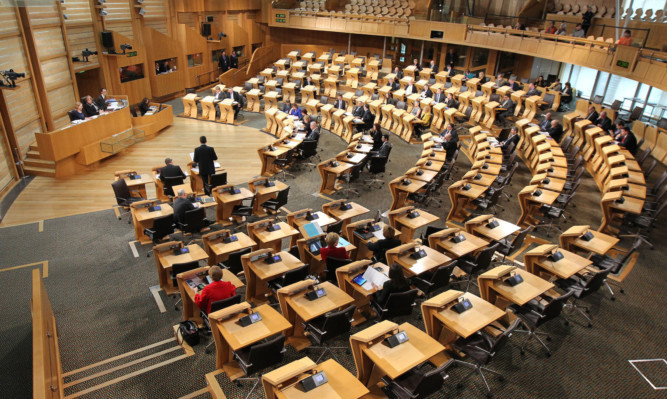
Thousands of taxpayers’ pounds are being wasted on “pointless” parliamentary motions, an MSP has claimed.
Motions are a way for backbench MSPs to raise issues or try to spark debates in the Scottish parliament but Alex Rowley MSP says most are “fairly meaningless” and called for a rethink on the practice.
New figures from the Scottish Parliament show nearly 10,000 motions have mentioned the word “congratulates” since 1999, at a cost of around £60,000 in administration costs.
Envisaged as the stepping stones to new laws, MSPs mainly now use motions to congratulate the achievements of local community groups or further their own personal interests.
The late independent MSP Margo MacDonald nailed the issue of pointless parliamentary motions when she said: “If an MSP wants to congratulate the local bowls club, just send them a card.”
Among the subjects raised in recent years was whether or not Scotland should have its own Eurovision Song Contest and an MSP’s daughter winning a school prize.
Holyrood bosses last night insisted the motions system was “useful” but Labour’s Alex Rowley, member for Cowdenbeath, said: “My frustration is what we see is thousands of fairly pointless motions from MSPs where they are congratulating or recognising schools or community groups’ achievements.
“I am not knocking that recognition, I just don’t know why it has to be done in the parliament, clogging up the bureaucracy we have here. There must be another way of achieving that and leaving the parliament and its MSPs to concentrate on the issues which constituents are really worried about.
“It’s frankly a bit of a game and we should be asking questions about what are we doing with our time in this place. People will say I am just in the door, and I don’t think my view is popular with colleagues, but I do think we need to have a serious think, more generally, about improving the way we work at Holyrood.”
Figures produced by the parliament’s information service show there was a total of 1,091 parliamentary motions submitted in 2000/01. By last year this tally had jumped to 3,682.
Many are formal motions needed for members to vote on when new legislation is being passed through Holyrood. But a search of the motions database has revealed 9,992 entries include the work “congratulates”, while more than 1,000 are related to lottery funding announcements for local communities.
The estimated cost of processing a motion ranges from £4.67 to £5.69.
Last year Nationalist MSP Christine Grahame called, through a parliamentary motion, for a review of the system.
She said: “Congratulatory messages should follow a separate process such as a message board on the parliament’s website or contained in an interactive display in a public area.”
The total number of motions submitted from May 12, 1999 to May 10, 2014 was 29,510.
A Scottish Parliament spokeswoman said: “A motion is a way in which members can initiate debate or propose a course of action. While most are not intended for debate, they can be a useful way of drawing attention to a particular local issue or event.”
In 2002, SNP MSP Kenneth Gibson used a motion to congratulate Nationalist colleague Colin Campbell on the birth of his eighth grandchild. Six years later he then used the official parliamentary motion system to praise his own daughter for winning a school prize.
In 2004, Socialist MSP Carolyn Leckie called on MSPs to back her bid for Scotland to have a separate Eurovision song contest entry.
In 2006, Green Party MSP Robin Harper tabled a parliamentary motion urging that releases of balloons be banned, except for scientific purposes.
In 2008, Nationalist Christine Grahame asked Holyrood to recognise the talents of rock legends AC/DC and the following year she hit out at the TV coverage of the English cricket team’s Ashes series win over Australia which was “apparently of more importance than the continuing starvation of millions in Niger”.
Last year Labour backbencher Mary Fee, convener of Holyrood’s equal opportunities committee, lodged a parliamentary motion marking the fact a superhero in the X-Men comic proposed to his boyfriend.
What do you think?
Do parliamentary motions serve an important purpose, or should politicians have better things to do? Let us know in the comments below.

Enjoy the convenience of having The Sunday Post delivered as a digital ePaper straight to your smartphone, tablet or computer.
Subscribe for only £5.49 a month and enjoy all the benefits of the printed paper as a digital replica.
Subscribe